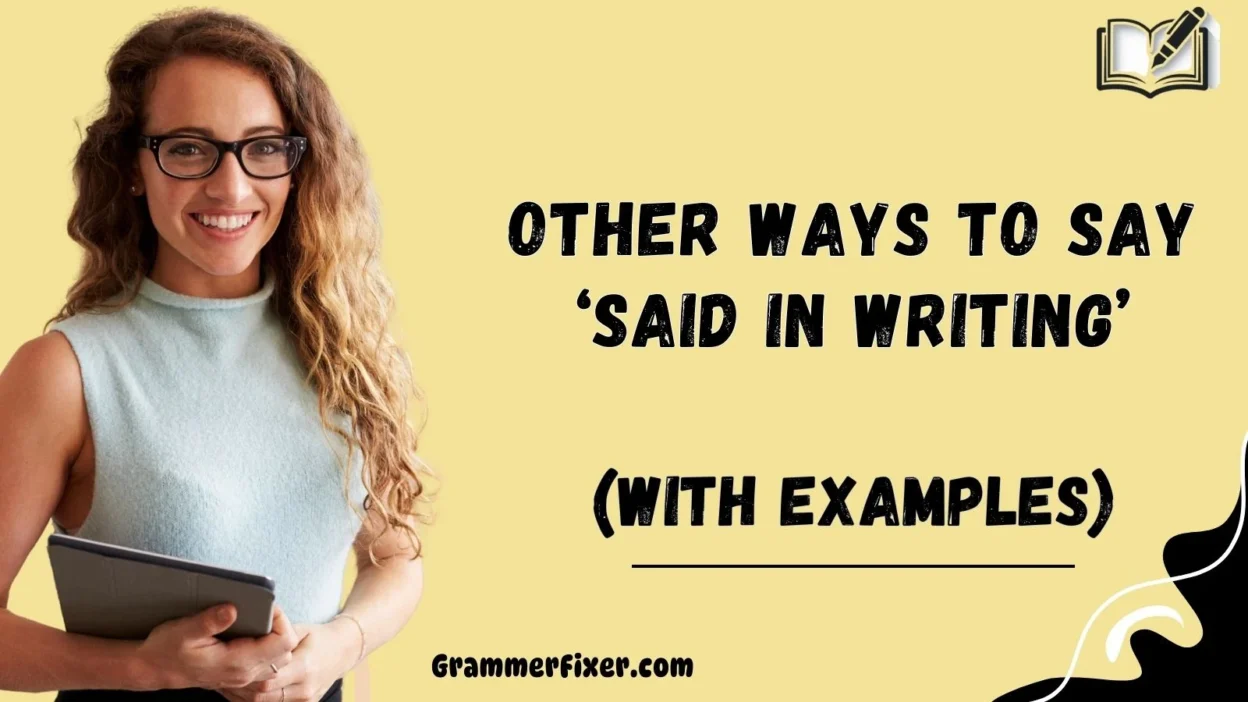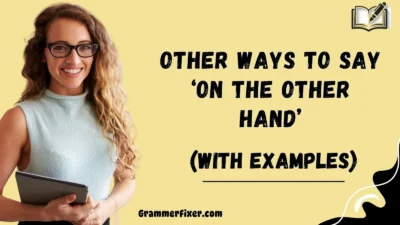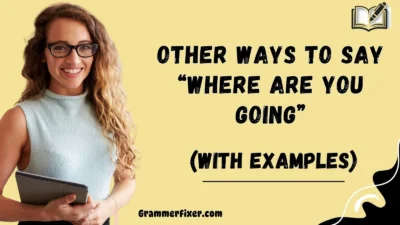Finding the right words in writing is more than just a stylistic choice—it’s a way to express care, intention, and emotion. Using the same word, like “said”, over and over can sometimes feel tedious or even flatten the tone of a scene.
By exploring alternatives, writers can make their work more engaging, personal, and meaningful. Whether you’re working on a novel, dialogue, essay, or even professional writing, these substitutions can help you communicate more confidently and enhance the reader’s experience.
What Does “Said” Mean?
The word “said” is one of the most common dialogue tags in the English language. It identifies who is speaking without drawing much attention to itself.
Because it’s so familiar, readers often skim over it, allowing the focus to remain on the dialogue itself.
When to Use “Said”?
You should use “said” when you want a straightforward, functional, and neutral tag that doesn’t interfere with the tone of the conversation.
It works best in fast-paced dialogue or when the characters’ emotions are already clear from their words.
Is It Professional/Polite to Say “Said”?
Yes—“said” is considered both professional and polite. It is a neutral word that avoids judgment and fits both fictional and nonfiction writing, including reporting, essays, and formal writing.
Pros or Cons of Using “Said”
Pros:
- Clear, simple, and widely understood.
- Doesn’t distract from dialogue.
- Works across genres: fiction, nonfiction, reporting.
Cons:
- Can feel repetitive or monotonous if overused.
- Misses opportunities to convey emotion, tone, or action.
- Lacks descriptive depth compared to other verbs.
1. Whispered
Meaning: To speak softly, often with secrecy or intimacy.
Detailed Explanation: Using “whispered” adds an element of closeness, tenderness, or secrecy, making dialogue feel more personal.
Scenario Example:
- “I’m so proud of you,” Bella whispered into her daughter’s ear.
Best Use: Emotional or intimate scenes.
Worst Use: Action-packed or loud arguments.
Tone: Gentle, secretive, intimate.
2. Murmured
Meaning: A soft, continuous, low sound of speaking.
Detailed Explanation: Suggests affection, hesitation, or quiet reflection.
Scenario Example:
- “You did an incredible job,” Samuel murmured, his smile warm and proud.
Best Use: Tender or reflective moments.
Worst Use: Clear, direct communication.
Tone: Quiet, thoughtful, affectionate.
3. Replied
Meaning: To answer or respond.
Detailed Explanation: Adds clarity that the speaker is responding directly to someone else.
Scenario Example:
- “Yes, I’d love to join,” Priya replied to Jason with a smile.
Best Use: Back-and-forth conversations.
Worst Use: When no response is involved.
Tone: Neutral, clear, conversational.
4. Questioned
Meaning: To ask or express doubt.
Detailed Explanation: Shows the speaker is inquiring or challenging something.
Scenario Example:
- “Are you sure this is safe?” Zoya questioned, her brows furrowed.
Best Use: When showing curiosity or skepticism.
Worst Use: Simple statements.
Tone: Inquisitive, doubtful, probing.
5. Shouted
Meaning: To speak very loudly, often in anger or excitement.
Detailed Explanation: Captures heightened emotion, urgency, or volume.
Scenario Example:
- “Get out of the haunted house now!” Freddie shouted, his voice shaking with fear.
Best Use: Action, danger, or high emotion.
Worst Use: Quiet, reflective scenes.
Tone: Urgent, emotional, loud.
6. Declared
Meaning: To announce clearly and formally.
Detailed Explanation: Adds authority, finality, and pride to the words.
Scenario Example:
- “You are the best student of the year,” the principal declared proudly.
Best Use: Formal announcements or proud proclamations.
Worst Use: Casual conversation.
Tone: Confident, authoritative, proud.
7. Muttered
Meaning: To speak quietly, often in irritation or embarrassment.
Detailed Explanation: Suggests reluctance, shyness, or frustration.
Scenario Example:
- “I guess I could try again,” Alex muttered, avoiding eye contact.
Best Use: Showing annoyance, reluctance, or low confidence.
Worst Use: Clear, formal communication.
Tone: Subdued, frustrated, embarrassed.
8. Announced
Meaning: To make something known publicly.
Detailed Explanation: Suggests sharing important news to a group.
Scenario Example:
- “Dinner is ready!” Dad announced at the table.
Best Use: Big reveals or information-sharing.
Worst Use: Whispered, private moments.
Tone: Clear, formal, attention-grabbing.
9. Commented
Meaning: To give an opinion or observation.
Detailed Explanation: Implies casual or thoughtful reflection.
Scenario Example:
- “That apple pie smells incredible,” Molly commented happily.
Best Use: Observational or casual remarks.
Worst Use: Emotional outbursts.
Tone: Neutral, thoughtful, casual.
10. Exclaimed
Meaning: To cry out suddenly, often in surprise or joy.
Detailed Explanation: Adds energy and emotion, signaling excitement or shock.
Scenario Example:
- “I can’t believe we won the game!” Lucy exclaimed with joy.
Best Use: Surprise, joy, or sudden realization.
Worst Use: Neutral, calm conversation.
Tone: Excited, enthusiastic, emotional.
11. Remarked
Meaning: To make a casual or thoughtful statement.
Detailed Explanation: Suggests the speaker is observing or adding a point, without strong emotion.
Scenario Example:
- “That chalk art on the sidewalk is beautiful,” Courtney remarked with admiration.
Best Use: Calm, thoughtful, or casual dialogue.
Worst Use: High-tension arguments.
Tone: Neutral, observational, reflective.
12. Responded
Meaning: To answer or react to something said.
Detailed Explanation: Similar to “replied,” but adds a sense of engagement and participation.
Scenario Example:
- “I’m craving burritos,” Jason said. “So am I,” Priya responded with a grin.
Best Use: Active back-and-forth conversation.
Worst Use: Monologues or statements.
Tone: Engaged, conversational, interactive.
13. Mentioned
Meaning: To bring something up in conversation.
Detailed Explanation: Implies a casual, passing reference without emphasis.
Scenario Example:
- “I might take a vacation next month,” Terri mentioned while sipping tea.
Best Use: Casual details, side remarks.
Worst Use: Emotional declarations.
Tone: Informal, offhand, relaxed.
14. Noted
Meaning: To observe or highlight a point.
Detailed Explanation: Adds a sense of attentiveness or emphasis.
Scenario Example:
- “The coast was severely damaged by flooding,” the journalist noted in his report.
Best Use: Academic, professional, or reflective writing.
Worst Use: Heated emotional exchanges.
Tone: Clear, factual, thoughtful.
15. Stated
Meaning: To express something clearly and formally.
Detailed Explanation: Often used when giving facts, opinions, or formal remarks.
Scenario Example:
- “The universe is vast and beautiful,” the astrophysicist Carl Sagan stated.
Best Use: Academic, formal, or professional contexts.
Worst Use: Casual small talk.
Tone: Authoritative, professional, direct.
16. Recounted
Meaning: To narrate or retell events in detail.
Detailed Explanation: Used when someone is explaining past experiences.
Scenario Example:
- “We built the recipe from scratch,” the chef recounted, smiling at his team.
Best Use: Storytelling, memoirs, history.
Worst Use: Quick exchanges in dialogue.
Tone: Narrative, detailed, reflective.
17. Emphasized
Meaning: To stress the importance of something.
Detailed Explanation: Indicates the speaker is highlighting key points or showing urgency.
Scenario Example:
- “It’s necessary to avoid repeating mistakes,” Anthony emphasized during the meeting.
Best Use: Persuasive or professional writing.
Worst Use: Lighthearted or casual exchanges.
Tone: Serious, urgent, focused.
18. Recalled
Meaning: To remember and share a past experience.
Detailed Explanation: Suggests memory, nostalgia, or reflection.
Scenario Example:
- “My dad used to bake apple pie every Sunday,” Alex recalled warmly.
Best Use: Nostalgic, reflective writing.
Worst Use: Fast-paced dialogue.
Tone: Warm, reflective, nostalgic.
19. Insisted
Meaning: To demand firmly or persistently.
Detailed Explanation: Adds a tone of determination and unwillingness to back down.
Scenario Example:
- “We must follow the rule of thumb,” Zoya insisted strongly.
Best Use: Strong arguments, passionate dialogue.
Worst Use: Calm or playful moments.
Tone: Firm, determined, assertive.
20. Suggested
Meaning: To propose or recommend something.
Detailed Explanation: Indicates advice, ideas, or encouragement.
Scenario Example:
- “Why don’t we try a different game tonight?” Molly suggested.
Best Use: Brainstorming, recommendations, casual planning.
Worst Use: Arguments or orders.
Tone: Friendly, collaborative, encouraging.
21. Explained
Meaning: To make something clear by describing in detail.
Detailed Explanation: Adds depth by clarifying or teaching.
Scenario Example:
- “The rains damaged many houses along the coast,” the residents explained.
Best Use: Teaching, reporting, clarifications.
Worst Use: Simple, obvious statements.
Tone: Informative, clear, patient.
22. Announced
Meaning: To make information public in a formal way.
Detailed Explanation: Often indicates a moment of importance or pride.
Scenario Example:
- “I’ve decided to retire,” the queen announced to her advisors.
Best Use: Big reveals, formal declarations.
Worst Use: Casual chat.
Tone: Formal, confident, official.
23. Reported
Meaning: To give an account of events or information.
Detailed Explanation: Suggests factual relaying of news or updates.
Scenario Example:
- “Several residents were displaced,” the journalist reported.
Best Use: Journalism, nonfiction, professional writing.
Worst Use: Casual conversation.
Tone: Objective, factual, professional.
24. Repeated
Meaning: To say something again for emphasis.
Detailed Explanation: Implies persistence, insistence, or emphasis.
Scenario Example:
- “I said no,” Lucy repeated, crossing her arms.
Best Use: Arguments, emphasis, clarification.
Worst Use: New information.
Tone: Firm, insistent, repetitive.
25. Sobbed
Meaning: To cry uncontrollably while speaking.
Detailed Explanation: Conveys deep sadness, despair, or grief.
Scenario Example:
- “I don’t know what to do,” Bella sobbed, tears flooding her face.
Best Use: Emotional breakdowns, grief writing.
Worst Use: Calm or professional exchanges.
Tone: Sad, broken, vulnerable.
26. Laughed
Meaning: To express amusement through laughter.
Detailed Explanation: Adds joy, humor, or lightheartedness to dialogue.
Scenario Example:
- “That goat really scared the cow,” Brian laughed, shaking his head.
Best Use: Humorous or casual scenes.
Worst Use: Formal or tragic situations.
Tone: Playful, joyful, amused.
27. Gushed
Meaning: To speak with enthusiasm or admiration.
Detailed Explanation: Conveys excitement, pride, or deep appreciation.
Scenario Example:
- “You did an incredible job!” Alex gushed, smiling widely.
Best Use: Praising, celebrating, showing pride.
Worst Use: Serious or professional contexts.
Tone: Excited, affectionate, proud.
28. Demanded
Meaning: To order forcefully.
Detailed Explanation: Suggests anger, urgency, or authority.
Scenario Example:
- “Tell me the truth now!” Jason demanded, his fist clenched.
Best Use: Intense conflicts, power struggles.
Worst Use: Friendly, lighthearted talk.
Tone: Angry, forceful, authoritative.
29. Suggested
Meaning: (Alternative phrasing: recommended gently).
Detailed Explanation: Encourages a choice without force.
Scenario Example:
- “Why don’t you rest for a while?” Molly suggested kindly.
Best Use: Gentle guidance, collaboration.
Worst Use: High-stakes or emotional arguments.
Tone: Caring, soft, encouraging.
30. Concluded
Meaning: To bring something to an end.
Detailed Explanation: Suggests finality, closure, or wrapping up thoughts.
Scenario Example:
- “That’s why we must act quickly,” Anthony concluded his speech.
Best Use: Summaries, formal conclusions, persuasive writing.
Worst Use: Casual, incomplete conversations.
Tone: Final, thoughtful, formal.
Conclusion
Using different words instead of “said” can help writers express tone, emotion, and nuance more clearly. While “said” is a reliable and professional choice, sometimes adding variety helps engage the reader and avoid monotony.
Best Use of Alternatives: Emotional, descriptive, or dramatic writing.
Worst Use of Alternatives: When overused to the point of distraction.
Tone of Alternatives: Ranges from intimate and gentle (whispered) to forceful and loud (demanded).
By practicing moderation and choosing words intentionally, you can craft dialogue that feels both natural and captivating, ensuring your characters’ voices shine through every page.



